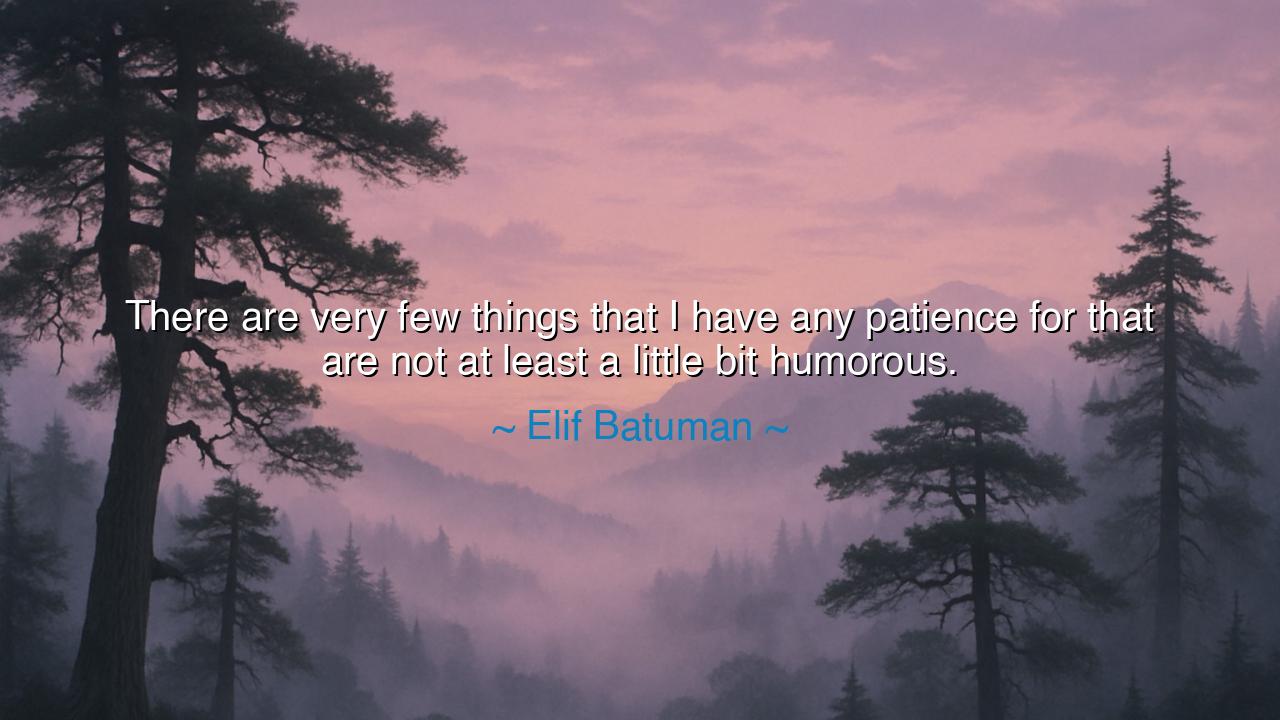
There are very few things that I have any patience for that are
There are very few things that I have any patience for that are not at least a little bit humorous.






In the words of Elif Batuman, writer of wit and depth, we find a reflection not only on personal taste but on the essence of endurance: “There are very few things that I have any patience for that are not at least a little bit humorous.” Though light in tone, her saying touches upon an ancient truth—that laughter is not mere amusement, but a balm for the soul, a lens through which the hardships of life can be endured, and a measure by which the trivial may be borne.
For what is patience but the art of bearing what would otherwise weary us? And what is humor, if not the spark that makes the heavy lighter, the dull more bearable, the painful less sharp? Batuman reveals that her endurance grows only where laughter dwells. This is no small thing, for even the philosophers of old knew that the human heart tires quickly when deprived of joy. Thus, humor becomes not a distraction but a companion to patience itself.
Recall the tale of Diogenes of Sinope, the Cynic philosopher who mocked kings and commoners alike, using humor to expose vanity and hypocrisy. To many, his wit seemed crude; to others, it was the only truth sharp enough to pierce the pretenses of society. Yet through his laughter, he endured poverty, hunger, and disdain. Humor gave him strength where solemnity alone would have crushed him. In this way, Batuman’s words echo the wisdom of Diogenes: that only those who find mirth amidst hardship can bear long with the absurdities of life.
The origin of her thought is bound in the human condition itself. In every age, the people have turned to comedy in times of trial. The Greeks had Aristophanes, whose plays brought laughter even as Athens waged war. In the darkest years of the Middle Ages, jesters in royal courts softened the blows of fate with ridicule and song. And in modern times, when nations trembled in uncertainty, comedians rose to remind us that laughter is rebellion against despair.
The meaning of Batuman’s confession, then, is not simply preference—it is philosophy. She unveils a way of life: to endure only that which carries a touch of humor. This is wisdom, for humor brings humility, reminding us not to take ourselves or our struggles with too much solemn weight. It is also a form of discernment: if a matter has no lightness, no joy, no spark of humanity, then perhaps it is not worth long patience at all.
Yet her words also carry a gentle warning. Without humor, patience becomes brittle; it may last a while, but it will eventually shatter. If one is to face the endless burdens of duty, society, or personal struggle, one must find—even in the smallest measure—a reason to laugh. For laughter is not denial, but strength disguised in play.
The lesson for us is this: seek out the humorous in your daily burdens, for it will extend your patience and lighten your spirit. When life grows too heavy, ask yourself: Where is the spark of joy in this? What part of this absurdity can I laugh at, rather than suffer from? And when you find it, hold fast to it, for it will carry you further than grim determination alone.
So live as Batuman suggests, children of wisdom: cultivate humor as a shield, wield it as a tool, and let it be the lamp that lights your patience. For in laughter lies resilience, and in resilience, the power to endure not only the trivial but the weighty matters of life with grace.






AAdministratorAdministrator
Welcome, honored guests. Please leave a comment, we will respond soon